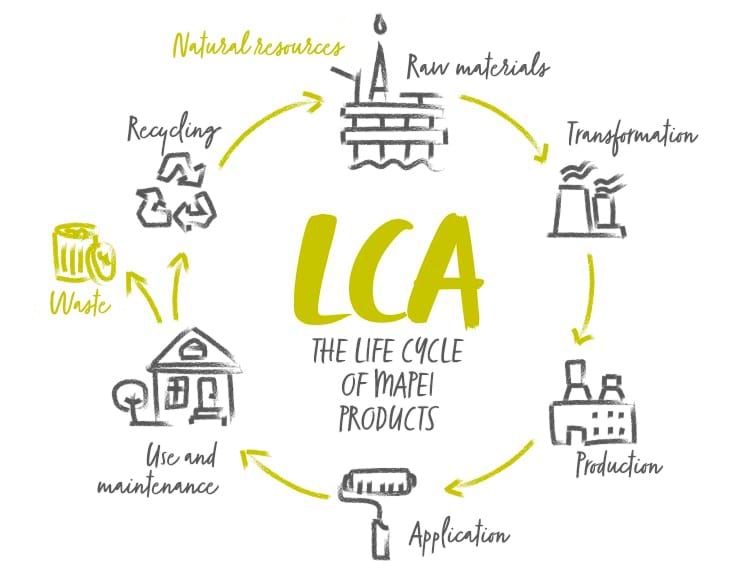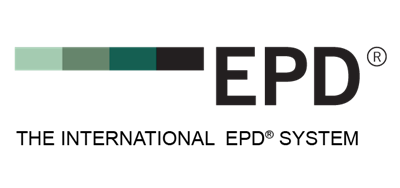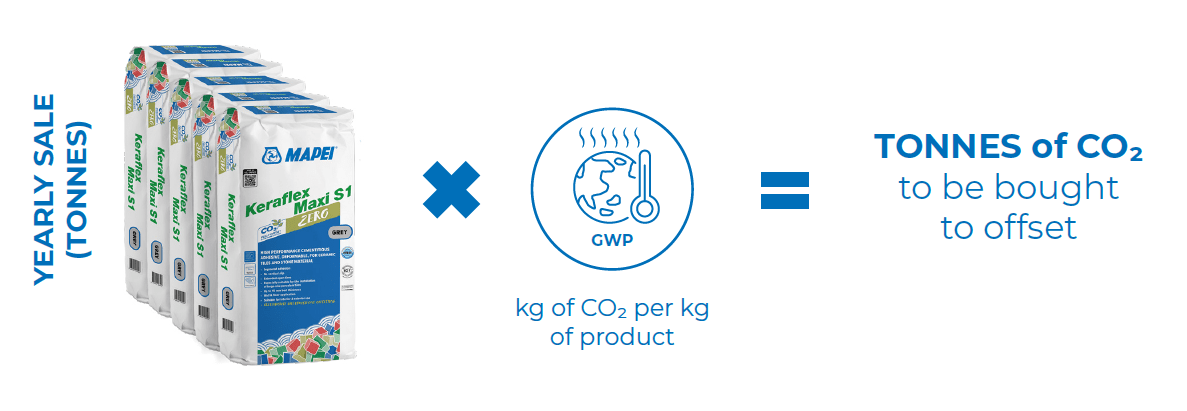CO2 emissions measured throughout the life cycle of products from the Zero line in 2025 using Life Cycle Assessment (LCA) methodology, verified and certified with EPDs, have been offset through the acquisition of certified carbon credits in support of forestry protection projects. A commitment to the planet, to people and to biodiversity. For more details on how emissions are calculated and on climate mitigation projects financed through certified carbon credits, click here.

The residual CO2 emissions from the products of the new Mapei ZERO line are fully offset; a commitment to quality that enables the construction and sustainable renovation of existing buildings, with an eye toward future generations, the well-being of the planet, and those who inhabit it.

CO2 emissions from our products are expressed in kg CO2 eq/kg of product and are calculated using standardised LCA (Life Cycle Assessment) methodology. The analysis of the life cycle of a product is an evaluation of the environmental impacts the product has throughout all the various phases of its life, from cradle to grave: from extraction of the raw materials that make up the formula to their transport to the production plant, the production cycle, product packaging, waste materials, transporting the finished product to the distributor and its final disposal.

The results obtained through LCA are verified and certified by an external body with an EPD, or Environmental Product Declaration. An EPD shows the environmental impact of a product during its life cycle.
Once the amount of CO2 has been calculated and expressed in kg CO2eq/kg of product, this figure is multiplied by the amount in tonnes of product sold.

Alongside the three Mapei Group’s pillars of internationalisation, specialisation and Research & Development, great attention has begun to be focused on ecological issues, the impact of products on the environment and health, and emissions into the air. In a nutshell, the question of environmental sustainability.
“We have been studying volatile organic compounds (VOC) for over 20 years. Our job is to study the distinctive traits of our products in terms of their healthiness, subsequently subjecting them to laboratory testing carried out by third parties so as to be awarded low-emission certifications, such as EMICODE issued by GEV, the German association for controlling emissions of building products that Mapei has been part of since 2005” said Mikaela Decio.
Since 2015 Mapei has had the tools and expertise required to measure the environmental impacts of its products throughout their whole life cycle. This allowed Mapei to set up a department within the organisation which performs life cycle assessments of its products and releases environmental product declarations (EPDs).
So, what does it mean to study the sustainability of chemical products?
“It means going about our various activities looking after the health and safety of installers and end consumers, ensuring more comfortable living conditions for people, minimising environmental impact during product manufacturing, packing, usage and disposal and, lastly, ensuring the sustainability of the buildings in which certain products are used, reducing their environmental impact”.
An indispensable driver in achieving the company’s goals in terms of sustainability is Research & Development activities, one of the operations the company is most proud of (70% of Mapei’s research is focused on developing eco-sustainable products). Research which, over the years, has worked along a combination of two different lines aimed at protecting people and making them more comfortable in indoor settings, while maintaining quality and durability standards: the gradual elimination of hazardous substances contained in products (Substances of Very High Concern, SVHC) and reducing the amount of substances emitted by these products during installation and use (VOCs). Working along these lines, Mapei has gradually emitted the use of solvents in its own products, such as adhesives for resilient materials, replacing them with water-based formulations.
Read more about Mapei's sustainability initiatives in the attachment below.